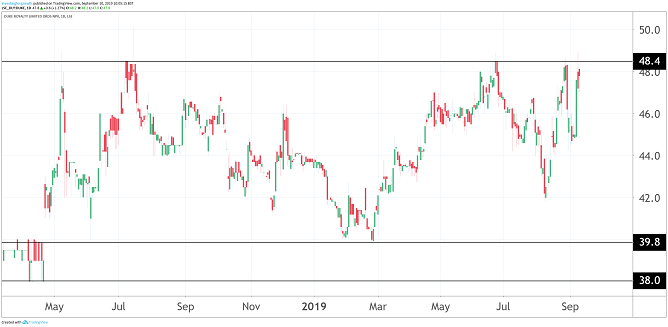Stockwatch: Over-optimistic dividend expectations here?
It talks of a double-digit dividend in time, but our companies analyst isn't so sure anymore.
10th September 2019 10:42
by Edmond Jackson from interactive investor
Share on
It talks of a double-digit dividend in time, but our companies analyst isn't so sure anymore.

AIM-listed Duke Royalty Limited (LSE:DUKE) is another Guernsey-based specialist investment company, quite like Burford Capital (LSE:BUR) in litigation finance. It claims contra-cyclical virtues, that operational leverage will kick in as costs stabilise and revenues grow. Or is this wishful thinking, a late fruit of the monetary stimulus years?
A week ago, I edged towards caution on the £350 million mining finance royalty group Anglo Pacific (LSE:APF), adjusting my stance from 'buy' to 'hold', chiefly because of the global economic outlook: coal demand and prices being more sensitive to a downturn than most commodities.
As if respecting this risk, Anglo's board had begun diversifying into copper production royalties, although copper prices are also vulnerable when economic fears erupt.
Subsequently, the directors have bought around £164,000 worth of shares at around 191p, which is still the current price as the market ponders the future for commodities in any downturn. I still consider a 'hold' stance on Anglo more appropriate than 'buy': directors close to deals may naturally enthuse, yet macro trends are more influential.
So, the dicey outlook for commodities is behind my current caution on Anglo, rather than being a thumbs-down on the royalties model which is long-term finance based on monthly payments linked to revenues. In which case surely the same applies to AIM-listed Duke Royalty (DUKE), which, at around 47p, is capitalised at £94 million?
I drew attention as a 'speculative buy' at 49p in July 2018 when Duke was kicking off. Its model typically involves investees paying a monthly royalty of 12% to 15% of the financing amount during the first year; thereafter, monthly distribution is linked to annual revenue growth.
The appeal is said to be long-term finance at lower cost of capital than equity, without dilution or loss of control, with Duke aiming for situations with predictable cashflows. In principle, it's aimed astutely at investors hungry for yield, but in practice only time will tell how risky its returns are.
A mini conglomerate of financial interests
Fourteen months on, the stock has traded in a 40p to 49p range and a motley portfolio of interests has been assembled – it quite reminds me of the "mini conglomerate" equity boom in the 1980's. The parallel being, Duke has signalled willingness to take equity stakes in investees if only as a sweetener not explicitly paid for.
In April 2018, it put £7.5 million into one of the UK's leading glass merchants/processors; then in August made a £44 million placing at 44p, initially deploying £10 million into a Canadian healthcare facilities group; then in February 2019 made the acquisition of its only rival, Capital Step, "with an initial implied enterprise value of £21.7 million. So, it quickly raised the portfolio from five to eleven situations. Also, in February, £10 million was put into the UK's largest recreational vehicle parts wholesale company.

Source: TradingView Past performance is not a guide to future performance
Yesterday's results for the year to end-March 2019 showed balance sheet cash at £5.9 million, since when at end-May Duke made a £1.4 million follow-on financing of Welltel Ireland (a telecoms provider to 3,000-plus business customers, originating from the Capital Step acquisition), and at end-August £250,000 into Pearl & Dean (a UK/Irish cinema advertising business).
It struck me that circa £4.25 million of cash resulting didn't square with management's claim of "a large pipeline of new opportunities in late stage negotiation" and, indeed, today Duke has announced a new £30 million revolving credit facility (replacing a £15 million one) for five years and an interest rate equal to LIBOR plus 7.25% a year, which improves on 9.5%. That's still quite a hurdle if the global economy slows markedly.
More positively, a diversified portfolio with uncorrelated returns does make sense – this isn't an investment holding company having to stretch overseeing/management time – although Duke does have ambitious targets for dividend payouts that I find difficult to endorse.
| Duke Royalty Limited - financial summary | ||||||
|---|---|---|---|---|---|---|
| year ended 31 Mar | 2014 | 2015 | 2016 | 2017 | 2018 | 2019 |
| Turnover (£ million) | -4.9 | -6.1 | -2.4 | 0.0 | 1.8 | 6.1 |
| IFRS3 pre-tax profit (£m) | -5.7 | -6.9 | -4.1 | -1.4 | -0.9 | 1.9 |
| Normalised pre-tax profit (£m) | -5.7 | -6.9 | -3.9 | -1.3 | 0.4 | 2.8 |
| IFRS3 earnings/share (p) | -231 | -303 | -65.4 | -15.8 | -1.4 | 1.1 |
| Normalised earnings/share (p) | -231 | -303 | -63.2 | -15.8 | -1.4 | 1.8 |
| Price/earnings multiple (x) | 26.3 | |||||
| Free cash flow per share (p) | -38.3 | 15.7 | 3.8 | -8.3 | 0.4 | 1.7 |
| Dividend per share (p) | 2.1 | 2.8 | ||||
| Dividend yield (%) | 5.9 | |||||
| Covered by earnings (x) | 0.6 | |||||
| Net tangible assets per share (p) | 416 | 138 | 26.3 | 32.0 | 33.3 | 44.1 |
| Source: historic Company REFS and accounts |
A jump in revenues, but costs also
The Capital Step acquisition has helped re-rate total income from £1.8 million to £6.1 million and operational cash flow from £0.2 million to £4.1 million. Duke says, "the predictability of our cash flow increasing confidence for shareholders in times of volatility...one of the characteristics which ensures royalty finance businesses are well-positioned to weather economic and political headwinds, such as those currently being felt in the UK."
Operating expenses of £1.4 million are said to be within budget, and there's a carrot for shareholders:
"While some further additions may be required in the future, the group's central operating cost...now allows for operating leverage. As further capital is raised and deployed, a large proportion of the income generated...will fall to the bottom line."
Yet the income statement shows a raft of costs, with insiders/advisers doing well, raising my regular concern about listed finance/investment businesses potentially compromising shareholder returns if a private partnership mentality is applied within a public company framework.
Directors' fees have soared from £132,065 to £550,555, also investment committee fees from £37,500 to £127,217 despite there being only two royalty deals this last financial year. Legal and professional fees have leapt 122% to £508,915. Furthermore, royalty investment transaction costs leapt 65% to £807,756, also £700,548 in respect of the acquisition.
The chairman's report says £650,000 worth of advisory fees on the royalty deals have been expensed during fiscal 2019, but which are payable over terms up to 30 years. But you quite wonder at duplication of sourcing/assessment of deals across directors, this committee also being third-party advisers (beyond their due diligence).
So, a 44% rise in total operating expenses over £3.8 million is mitigated by lower fees for "support services and royalty participation". Hopefully, expenses are now stabilised and operational gearing kicks in.
Almost £12 million of debt has meant nearly £0.4 million interest payable; it's unclear quite how this will pan out if debt rises albeit at lower cost.
Dividend payout appears a crux for perception
It appears the adjusted net profit of £2.8 million is ahead of the £2.4 million expected, with normalised earnings per share (EPS) of 1.8p a tad behind the 2.1p expected. But a 2.8p dividend was in line, equating to an historic yield close to 6% - or 7% if expectations for about 3.3p are met this financial year.
It strikes me that the payouts are very full: £4 million being close to the total of last year's £4.1 million net cash inflow from operations, although management presents this as a virtue.
My sense is more conservative; that an investment company might retain some cash for redeployment, in a broad objective for capital growth too. However, management has rather bound itself by a promise when £44 million was raised in July 2018. "Upon full capital deployment the board believes that Duke will be able to increase the company's dividend to a near double-digit yield." Versus a placing price of 44p that implies a circa 4p a share payout.
Recent forecasts have been for 2020 adjusted EPS of 3.7p based on £7.5 million net profit and £11.6 million, but the increased credit facility could amplify the outcome if attractive deals are sourced.
My reading of this is management dangling expectations a bit far ahead of reality – by at least two years – given even a 3.3p dividend for 2020 would represent a 7.5% yield, which, like their soaring fees, is somewhat aggressive.
Broadly a 'hold'
Ultimately, the question is whether Duke's royalty "partners" will be compromised by any further slowdown in the UK and Europe, given royalty distribution is linked to revenue growth. In such a context, management appears to have targeted optimistically on the dividend.
So, I think the market is likely to suspend judgment until we see how deep the economic slowdown trends. I originally rated Duke a 'speculative buy' and, having allowed time to show what it can do, there are aspects I like and dislike. A ‘sell' stance would, however, be harsh if costs are indeed now better contained. Hold.
Edmond Jackson is a freelance contributor and not a direct employee of interactive investor.
These articles are provided for information purposes only. Occasionally, an opinion about whether to buy or sell a specific investment may be provided by third parties. The content is not intended to be a personal recommendation to buy or sell any financial instrument or product, or to adopt any investment strategy as it is not provided based on an assessment of your investing knowledge and experience, your financial situation or your investment objectives. The value of your investments, and the income derived from them, may go down as well as up. You may not get back all the money that you invest. The investments referred to in this article may not be suitable for all investors, and if in doubt, an investor should seek advice from a qualified investment adviser.
Full performance can be found on the company or index summary page on the interactive investor website. Simply click on the company's or index name highlighted in the article.
Disclosure
We use a combination of fundamental and technical analysis in forming our view as to the valuation and prospects of an investment. Where relevant we have set out those particular matters we think are important in the above article, but further detail can be found here.
Please note that our article on this investment should not be considered to be a regular publication.
Details of all recommendations issued by ii during the previous 12-month period can be found here.
ii adheres to a strict code of conduct. Contributors may hold shares or have other interests in companies included in these portfolios, which could create a conflict of interests. Contributors intending to write about any financial instruments in which they have an interest are required to disclose such interest to ii and in the article itself. ii will at all times consider whether such interest impairs the objectivity of the recommendation.
In addition, individuals involved in the production of investment articles are subject to a personal account dealing restriction, which prevents them from placing a transaction in the specified instrument(s) for a period before and for five working days after such publication. This is to avoid personal interests conflicting with the interests of the recipients of those investment articles.